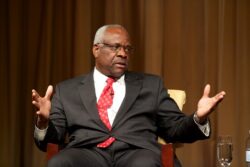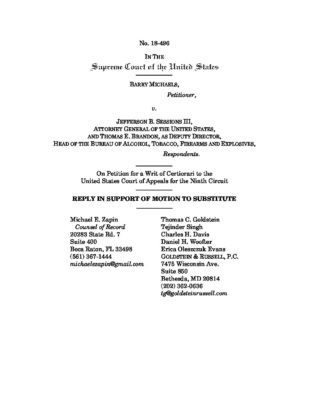For many years I shocked my students in Administrative (and before that Constitutional) law by offering a partial defense of Justice Clarence Thomas. Yes, I found his Constitutional views deeply misguided, especially his focus on a contestable view of the so-called original intent of the Constitution-writers or ratifiers at the expense of any subsequent evolution, not least the Reconstruction Amendments. And I am no fan of rigid formalism. But even so, I suggested, the Thomas project had some virtues of clarity and consistency, unlike that of Justice Scalia who it seemed to me was more likely to make first principles bend to results. And, mindful of Justice Brennan’s and Justice Marshall’s long refusal to give in to death penalty precedents, I was unwilling to say that ignoring the Court’s earlier decisions was inevitably bad.
That defense has been a bit muted lately as Justice Thomas has changed his mind on some key issues such as Chevron (although, ironically, I’ve never been big fan of the Chevron decision–originally a method to legitimate right-wing interpretations of statutes).
But now, I have come around to thinking that it may be time for Justice Thomas to do the decent thing and resign. If this ProPublica report, Clarence Thomas Secretly Participated in Koch Network Donor Events, is true, it comes on top of a series of revelations over secret luxury vacations, private jet flights, weird land deals, gifts for a relative’s private school tuition, and the deeply weird story of Justice Thomas financed his $267,230 R.V.
Lurking in the back of all this is the issue of the role of far-right activist and election denier Ginni Thomas, who appears to have benefited from concealed if not laundered payments from right-wing sources, While one might much prefer for a Justice’s spouse to be above all suspicion like Caesar’s wife, official spouses also need to be free to have views and live lives. It has gotten harder, over time, though, to buy the idea that the Justice never talks over legal matters with his wife….or his donors.
In a healthy democracy, Congress would be at least investigating whether there are grounds for impeachment here (if not, what exactly would it take)? In 1969, Justice Fortas resigned when it became known that two years before he joined the Court, Fortas took a secret retainer from the family foundation of a friend and former client subsequently imprisoned for securities violations. The deal provided that in return for unspecified advice, Fortas was to receive $20,000 a year for life. That was enough for Fortas to step down in the face of calls for his impeachment. From what’s been reported, the Thomas story seems at least comparable.
I have no illusions: Justice Thomas isn’t going anywhere while there is a Democratic President. And Congress wants to impeach Hunter Biden, or something. But this is just one more sign of an ill democracy.


 Post-Mueller, the Trump Family
Post-Mueller, the Trump Family 

